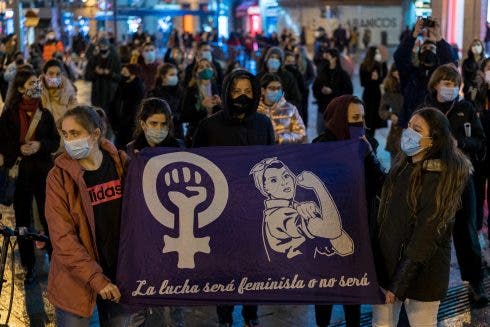EVERY year, the EU releases its ‘Gender Equality Index’, but where does Spain rank?

2023 was a big year for female equality in Spain.
In December, Spanish politicians approved an ‘Equal Representation’ Law designed to encourage gender parity in politics and business.
It followed a landmark victory for the country’s menstrual leave law, which was the first
in Europe to grant leave for women with painful periods.
Despite all these laws, controversy surrounding women’s rights continues to sweep the country. While some 67% of women believe discrimination remains ‘quite large’ in the country, over 44% of Spanish men say equality has ‘gone too far’.
So, how does Spain really perform when compared to other EU countries? The Olive Press investigates.
With 76.4 points out of 100, Spain ranks fourth in the EU’s Gender Equality Index.
6.2 points above the EU average, the country has moved up two places in the ranking since 2020.
The index is calculated based on a number of different indicators including time, knowledge, work, money, power and health.
Each of these is given a score worked out using a variety of data, for instance, power takes into account the amount of female board members in high ranking companies.
Although overall the country performs well in the GEI, it is still underperforming in various areas and is important to be aware of these, so where are Spanish women thriving and where are they struggling?
Time: 70.04/100
The improvement of the country’s time score (+6.4) has been one of the main drivers of Spain’s climb to fourth place.
This category considers the amount of time women spend doing care, domestic work and social activities compared to men.
Although Spain has improved in this area, women still carry the burden of care activities and domestic labour.
Some 41% of women care for family members, elderly people or those with disabilities, compared to 33% of men.
Meanwhile, 64% of women do cooking or household cleaning everyday, some 20% more than their male counterparts.
When it comes to social, leisure and cultural activities, the gender imbalance flips.
Some 39% of Spanish men say they frequently take part in such activities, compared to just 33% of women.
These statistics indicate that women have significantly less free time to engage in their hobbies and social lives due to the burden of domestic labour.
Although the stats have moved towards equality since the 2020 survey, it is clear much work still needs to be done.
Knowledge: 70/100

READ MORE: Spain passes new gender parity law on eve of International Women’s Day
This category has also contributed to Spain’s fourth place position, increasing by 1.7 points since the 2020 index.
The knowledge category surveys not only educational achievement but the segregation of men and women by subject studied.
In Spain, women actually outnumber men in educational attainment, representing 34% of university graduates and 23% of those training in non-formal education.
In comparison, men make up 32% of higher education graduates and 21% of those in vocational training.
Women also outnumber men in the fields of education, health and welfare, humanities and arts, representing almost half of university students.
Although men represent just 25% of students in this area, other studies indicate they greatly outnumber women in STEM subjects, accounting for 65% of university students.
Work: 75.4/100
Although Spain’s score may seem high, the country has actually dropped five places in the EU work ranking, now standing in 17th position.
This category looks at equal access to employment and good working conditions as well as the quantity of women in full-time work and the length of their careers.
Some 14% less women are employed in full time work compared to men, standing at 41% and 55% respectively.
Women’s working lives are also some three years shorter than men’s and their career prospects are worse.
On the career prospects index, an EU wide indicator of job quality, prosperity and security, Spanish women score 56 compared to men’s 57.
All of these statistics, though improved, indicate that women’s careers are affected by expectations to care for children.
A recent study by Spain’s National Statistics Institute (INE) showed some 24% of women aged 24-49 with children resort to part-time work in order to care for their children in comparison to 4.7% of men.
Meanwhile, 70% of Spain’s childcare work absences were granted to women, showing that they often sacrifice time at work to care for their families.
This impacts women’s amount of experience and progression at work, contributing further to inequality in the workplace.
Health: 91.2/100
One of the areas where Spain performs the best, this category looks at women’s health, life expectancy, habits and access to services.
While some 74% of Spanish men perceive their health to be ‘good’ or ‘very good’, compared to 69% of women, male life expectancy is some eight years lower than women’s, at 80 years old.
Despite this, both genders ‘healthy life’ years are equal, with men and women enjoying 63 years of good health.
Perhaps this balance is due to the fact that although women stick to healthier habits, they have less time to spend exercising compared to men.
Some 79% avoid tobacco and alcohol consumption compared to 69% of men.
But only 38% of women take part in daily physical activity and eat sufficient fruits and vegetables, 11% less than their male counterparts.
In terms of access to healthcare, women and men in Spain are fairly equal, with only 1% more women living with unmet dental or medical needs, compared to men.
READ MORE: What Women’s Day means to three generations of strong Spanish women
Power: 81.1/100

This domain, undoubtedly influenced by last year’s Equal Representation Law, looks at women’s decision making power in political, social and economic spheres.
Spain’s political equality has greatly advanced in recent years, women represent 48% of ministers, 42% members of parliament and 46% of regional assemblies.
In the economic sphere, 37% of the board of directors in Spain’s largest companies are made up of women.
Meanwhile, board members of Spain’s central bank are split 50/50.
However, in the world of sports and TV, the story couldn’t be more different.
Men represent 73% of decision makers in the country’s Olympic sports organisations and 60% in publicly owned broadcasters.
There’s no doubt that Spain has made strides to improve gender equality in public spheres such as business and politics.
However, in the domestic realm, women are still suffering the effects of gender stereotypes which oblige them to sacrifice their free time and careers for their families.
While legislation like the recent Menstrual Leave policy has been designed to alleviate this, there is still a long way to go in changing general societal attitudes which see women as primary caregivers despite their participation in the world of work.
That is not to say that other countries are not plagued by the same issues.
In fact, the UK scored 72.7 on the scale in 2020.
Although it is no longer included in the study due to Brexit, it had remained in 6th place for 10 years running with strong performances in the health and money categories.
The most room for improvement was in the realm of power, scoring a meagre 60 out of 100, also stepping backwards in the categories of knowledge, time and health.









